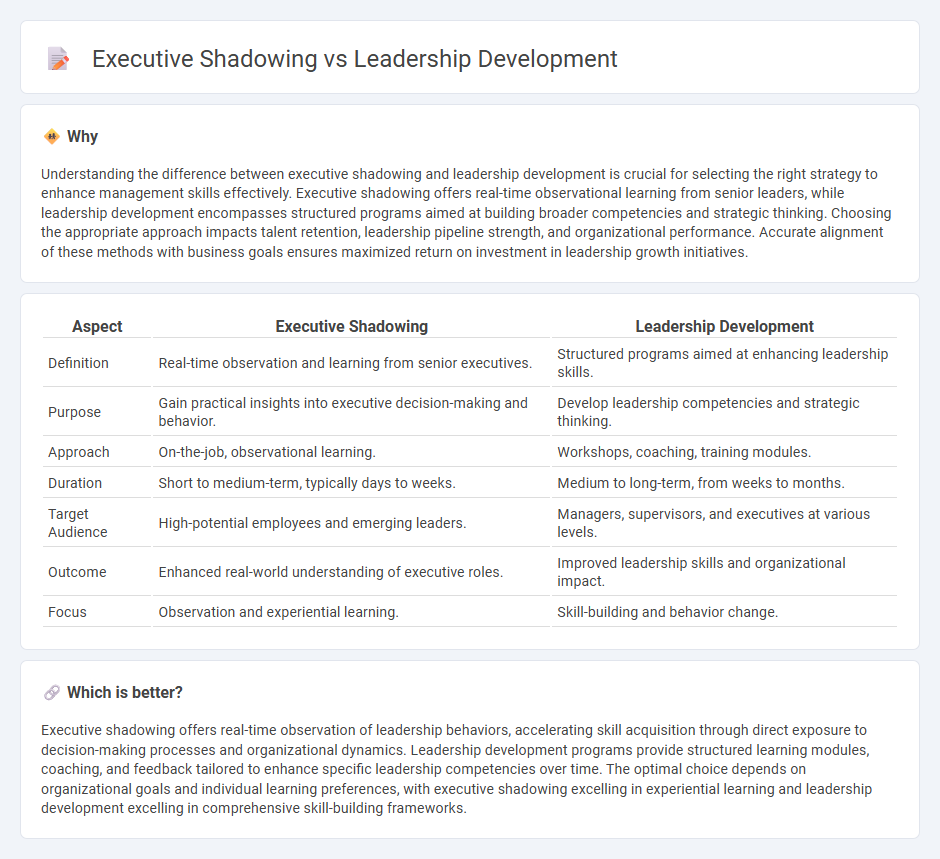
Executive shadowing offers immersive, real-time learning by observing senior leaders in decision-making processes and strategic interactions, enhancing practical leadership skills. Leadership development programs provide structured training, workshops, and coaching to cultivate essential competencies and foster long-term growth. Explore how combining executive shadowing with leadership development can accelerate your leadership effectiveness.
Why it is important
Understanding the difference between executive shadowing and leadership development is crucial for selecting the right strategy to enhance management skills effectively. Executive shadowing offers real-time observational learning from senior leaders, while leadership development encompasses structured programs aimed at building broader competencies and strategic thinking. Choosing the appropriate approach impacts talent retention, leadership pipeline strength, and organizational performance. Accurate alignment of these methods with business goals ensures maximized return on investment in leadership growth initiatives.
Comparison Table
| Aspect | Executive Shadowing | Leadership Development |
|---|---|---|
| Definition | Real-time observation and learning from senior executives. | Structured programs aimed at enhancing leadership skills. |
| Purpose | Gain practical insights into executive decision-making and behavior. | Develop leadership competencies and strategic thinking. |
| Approach | On-the-job, observational learning. | Workshops, coaching, training modules. |
| Duration | Short to medium-term, typically days to weeks. | Medium to long-term, from weeks to months. |
| Target Audience | High-potential employees and emerging leaders. | Managers, supervisors, and executives at various levels. |
| Outcome | Enhanced real-world understanding of executive roles. | Improved leadership skills and organizational impact. |
| Focus | Observation and experiential learning. | Skill-building and behavior change. |
Which is better?
Executive shadowing offers real-time observation of leadership behaviors, accelerating skill acquisition through direct exposure to decision-making processes and organizational dynamics. Leadership development programs provide structured learning modules, coaching, and feedback tailored to enhance specific leadership competencies over time. The optimal choice depends on organizational goals and individual learning preferences, with executive shadowing excelling in experiential learning and leadership development excelling in comprehensive skill-building frameworks.
Connection
Executive shadowing offers firsthand insights into leadership challenges, enhancing real-time decision-making skills crucial for leadership development. By observing seasoned leaders, emerging executives internalize strategic thinking and communication techniques that accelerate their growth. This experiential learning approach bridges theory and practice, fostering effective leadership capabilities.
Key Terms
Leadership Development: coaching, competency assessment, succession planning
Leadership development encompasses coaching, competency assessment, and succession planning to build effective leaders strategically aligned with organizational goals. Executive shadowing offers real-world exposure, but leadership development provides structured growth through personalized coaching and skill evaluation to ensure readiness for future roles. Discover how comprehensive leadership development drives sustained organizational success.
Executive Shadowing: observation, mentorship, exposure
Executive shadowing offers immersive observation opportunities, enabling leaders to witness decision-making processes and strategic actions firsthand. This mentorship-driven approach provides personalized guidance, fostering skill enhancement and leadership insight through direct exposure to experienced executives. Explore how executive shadowing can accelerate leadership growth and refine your professional capabilities.
Succession Planning
Leadership development programs enhance organizational succession planning by systematically building skills and competencies across potential leaders. Executive shadowing offers a focused experiential learning opportunity, allowing successors to gain insight into executive decision-making and leadership styles in real-time. Explore how combining both strategies can create a robust succession plan tailored to your organization's future leadership needs.
Source and External Links
Leadership Development Program (LDP)(r) | CCL - A 5-day immersive, research-based program designed for mid- to senior-level leaders to enhance leadership skills, build self-awareness, manage stress, and lead teams effectively across boundaries.
How to Create a Successful Leadership Development Program - A detailed guide on designing leadership development initiatives tailored to business priorities and leadership levels, emphasizing continuous learning, data-driven evaluation, and senior leader involvement.
Leadership Development Meaning & Importance - peopleHum - Leadership development is defined as enhancing an individual's ability to lead through coaching and mentoring programs that build confidence and bridge generational knowledge gaps within organizations.
 dowidth.com
dowidth.com